So it’s just over a year since I launched WP Email Capture Premium. Already it’s been one of the best things I’ve ever done online, providing me with a decent part time income over the last 15 months, as well as opened some pretty big doors for me. Largely through my own personal work I’ve become recognised a lot more as a WordPress developer, which is very nice.
However the last 15 months has been a bit of a learning curve in doing business with my code. There have been highs (the 5 sales in an hour day I had earlier on this year which saw me text a friend absolutely gushing with a grin the size of a Cheshire Cat), and lows. In short, these are the 15 things I’ve learned about WordPress Plugin Development.
1. Aim To Be the Best in The World At One Thing
If you’re getting into Premium Plugin, you will be starting off working on your own, and as such, you are one man or woman. Here’s the thing, you cannot be all things to all men. But you can be the go-to guy for one thing.
Am I going to say that WP Email Capture is the best WordPress Email Marketing Plugin? No, of course not. However I can confidently say that in the past year I have encountered one marketing service it doesn’t integrate with, and I’m spending some of my Christmas holidays making it so. WP Email Capture provides a solution to those who haven’t yet committed to an email marketing solution.
Get your Unique Selling Point, your elevator pitch, and stick to it. It may not come straight away, it may not be you who comes up with it (I found out mine when Jake Caputo was on the WP Candy Podcast), but it will come, and that is what you need to use to promote your plugin.
2. Added Features on Free will always beat Restricted Free
Often I see people make plugins and then remove functionality that was previously free to charge for it. Generally that is a pretty bad thing as you cause mistrust amongst your current, loyal plugin users. Instead I recommend developing features on top of your current plugin.
Often users will suggest ways of improving plugins, so if they come up with ideas for your premium plugin, use them.
3. Customer Service Is Too Important To Outsource
To borrow a phrase used in article shared by Pippin Williamson (which I cannot find): “Customer Support Is Too Important To Outsource ”.
I said to myself would be that I’d provide the best support as I possibly can for my plugin. It shouldn’t fail, but if it does, I’ll be there to fix it.
At first, I hated it, answering a bunch of queries which were largely the same. It was dull, dour and not the best use of my time. And then I wrote a FAQ page and most of the queries were stopped, and then I streamlined the channels so that support would come through a ticketing system if you were a premium subscriber, and the WordPress Support Forum if you were a free user of my plugin. Then it became easier, and the questions I answered got a lot easier and more interesting. I all of a sudden enjoyed providing support, and it began to show as one word answers were now getting longer form answers, as it was important to me to as well fixing the users’ problems, to also explain why they were having this issue. Nobody knew my plugin better than I did.
It showed as well, as people did notice. Often people thank me for timely support and I get emails such as this:-
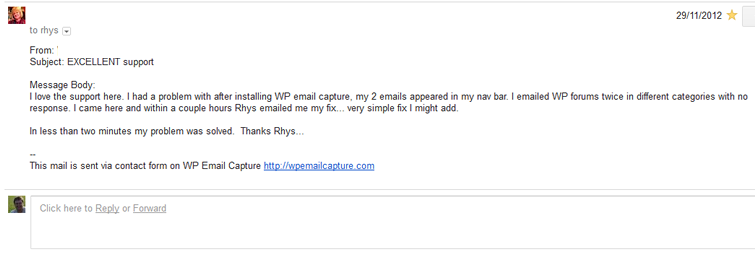
People were happy with their purchase, and people who weren’t happy with the purchase were happy with the support that made them happy with their purchase, which is great!
4. Success Happens Quietly, Failure Happens in Full View
At the moment, WP Email Capture premium has had just short of 200 sales, with support tickets hovering somewhere around the 80 mark. In short, the majority of my customers I’ve not spoken to. I’ve no idea If they like the plugin or not. I assume they do, as they haven’t taken advantage of the refund offer I have and the open rate of the buyers newsletter (which tells premium users that there is a new version of the plugin available) is over 75%. But beyond that, I know very little.
Incidentally, the first buyers newsletter where I specifically ask for feedback – a “State of the WP Email Capture” – will be sent in the next week or so.
However, success is quite quiet. Failure on the other hand is usually quite open.
Disgruntled users are often quick to complain that a plugin doesn’t do what they think it should, which hurts a bit.
This leads me onto the next point though.
5. Customers are not Clients
This is quite a big one for me.
You see, even though I am thankful for buyers, I’m not completely at their beck and call for them. Would you expect J.K. Rowling to write your wedding invitations because you purchased a Harry Potter book? Not really.
I have suffered some quite hurtful comments when users send over support requests, often due to them not reading documentation or (in one case) choosing to ignore it.
These are customers, and are not clients. I haven’t any contract between them, so often with these people I give a refund. You shouldn’t put up with hours of work, often with little or no reward, for the price of a plugin.
I should point out that 99.99% of customers are wonderful, and you will not have any problems.
And free users? Well I’ve already gone on record with what I think to people who are quite rude when requesting free support. I’ve no problems telling them well to go (and have done so in the last week). I’m not like this with everybody, and am usually quite helpful. But if you don’t treat me with respect then don’t expect me to help you.
6. Problems Working With Clients Are Easy To Deal With When You Have Customers
One of the best things about working with customers over clients is that issues for clients which are disastrous, are actually largely okay with customers.
Take for example the world’s worst form of feedback: “It’s buggy”. If a client came back to you and said that, then all of a sudden it becomes an issue you have to deal with.
However, I had a customer say the plugin was “buggy”. Turns out the WordPress version he was on was on 2.8.1, and my plugin was incompatible. After explaining this and explaining that his version was old, he upgraded and apologised.
7. When Securing Your Social Profiles, Don’t use “Coming Soon”.
Otherwise you end up with this, 15 months after launch……
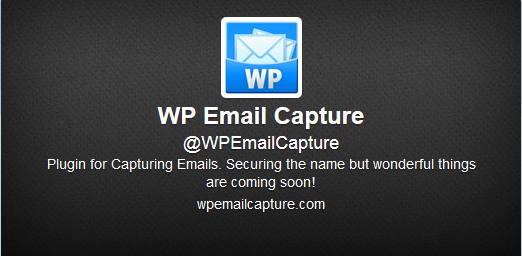
8. Get a Good Accountant the Second You Become Moderately Successful
Just trust me on this one.
9. Get Good At Marketing (or outsource it)
WP Email Capture was a remotely successful plugin when I started development on the premium version (20k ish downloads? Around that.) and when I released the plugin I had 2 sales on the first day, and then one sale the day after, and then it slowly died down.
Fact was, I had to start marketing it. Both of those sales days paled in comparison from when I was devoting 100% of my free time on developing and marketing the plugin. An interview on WP Daily (now torquemag) got me 4 sales in 1 day. I know correlation doesn’t mean causation, but it was nice.
In short, nobody cares about your plugin. Participate in the community, think about your audience, and get scribbling. Take every opportunity you can. Some will take off, some won’t (more on that a little later). But you need to be a good marketer, the “build it and they will come” mentality is rather dead, unfortunately.
10. Start Building Your List Yesterday
One of the best ways to market your plugin is by building your list.
If nothing else, even if you have nothing else, have a page on your site dedicated to your plugin, and stick a box on it to encourage signups: Mailchimp is free and good enough, Aweber is good as it’ll kick your arse into finishing the damn thing as you’re paying for it, Mailpoet is awesome if you’re on a dedicated server. Forget any of the top CRO tips out there, releasing a plugin has been the singularly best way to build an email list.
And if you cannot find a system for building your list, just install my plugin and you’ll come back to it later :).
11. Don’t Worry Too Much About Your Blog
WP Email Capture’s blog is rather quiet. In fact, except for plugin updates and a few recent guest posts, it’s rather dead.
I’m looking into improving it with guest posting and maybe just commissioning a few articles, but that is way down the list. By and large though having a quiet blog hasn’t really affected traffic to the site.
Do rudimentary content marketing (i.e. search for your brand name on Google and see what other searches appear, write a blog post about each of those searches), but other than that it’s quite sufficient as is.
12. Nobody Cares About Your Affiliate Programme
This was one of those things that I thought would take off but didn’t. Fact is, you can have generous commission structures, but nobody really cares too much about your affiliate programme. One guy is making a decent amount on the WP Email Capture affiliate programme (~$100/month), and that’s it. I think I’ve had about 20 people sign up for it.
Affiliate programmes, as well as your actual site, requires work. See if you can get a few people interested, but don’t worry too much about it.
13. Don’t Stop Free Development
One thing I was key on doing is not stopping free development, and it has benefited the plugin in a few ways.
First of all is the nice rush of downloads whenever there is a new version of WP Email Capture released, many of these are old customers updating the plugin, but many are new users. Users can turn into customers.
Secondly by getting new people looking at the plugin in itself can get ideas for added features, this is handy in increasing the value of your plugin. Though what I do is that if anybody suggests a feature, I will aim to make it either freely available or added in such a way that basic functionality is available for free.
14. Competitions are worthless if you’re not running them (or setting the rules a little bit).
One thing I don’t really understand too much but are popular are competitions. You know the score, a website will come to you, and ask if they can run a competition on your behalf. If the competition is “Retweet this for a chance to win!”, what they usually get is the following:-
- More twitter followers.
- Twitter retweets and increased exposure.
- A copy of the plugin (which I am not too bothered with).
And you get is usually nothing. Exposure wise it’s minimal for you (people who enter competitions are not usually buyers), furthermore you don’t even get a link to your site, as the link is usually an affiliate link.
Personally, I’m not a fan, and I’ve never made a sale from a competition.
I’m not saying that competition are a rubbish way to get exposure, but you need to help run it. Make sure one of the entrance conditions is to follow you. A service like Rafflecopter make this quite easy. Alternatively run the competition yourself, and therefore get all the benefit. That will work.
15. Do it! You don’t suck as much as you think!
This is the key thing for me. I’m an okay coder. I’m not great, but can code to decent WordPress standards and my code is usually functional and works well. You are probably similar. Trust me, it’s one of the best things I’ve ever done.

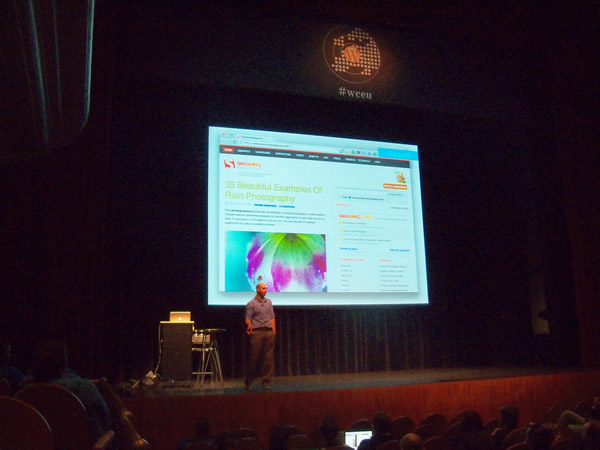
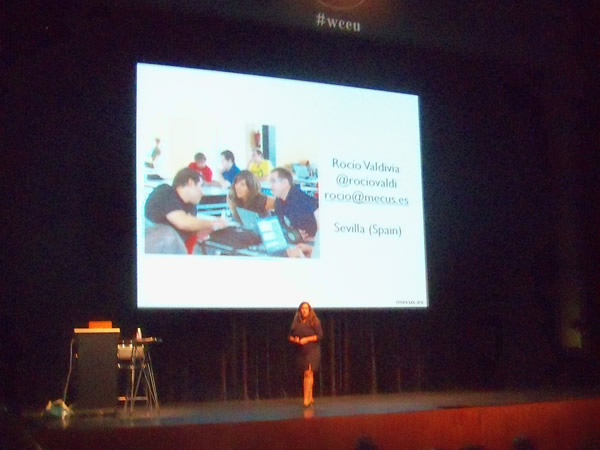
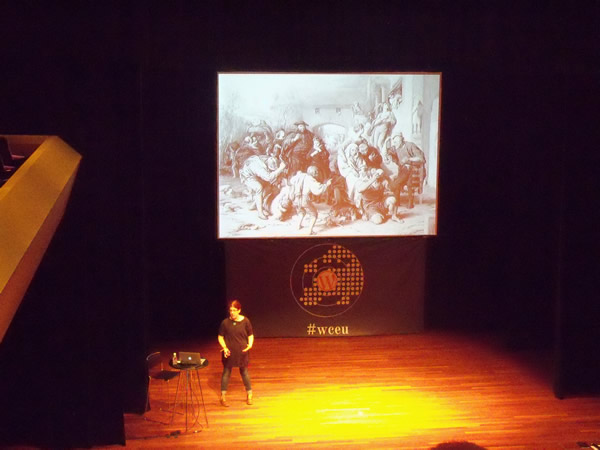

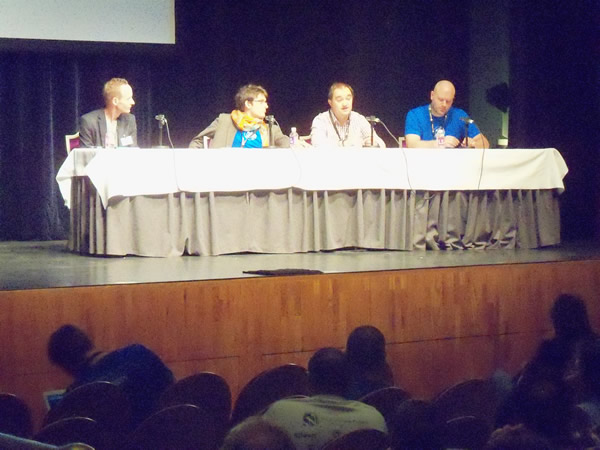

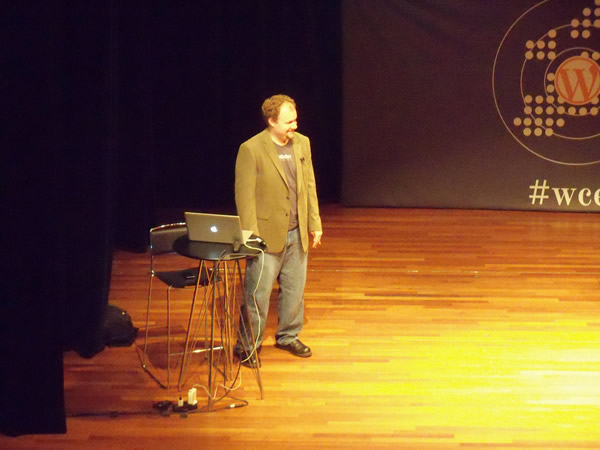

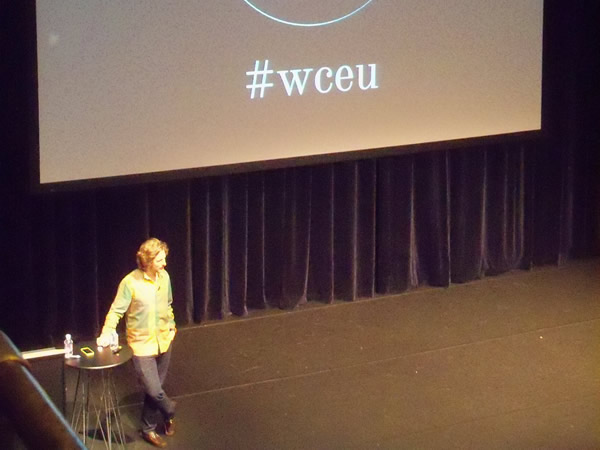

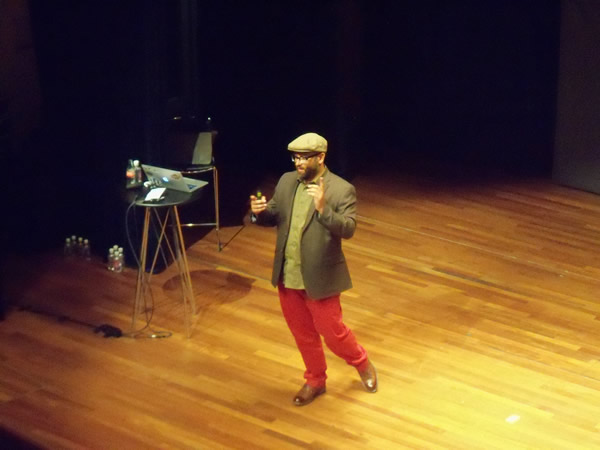
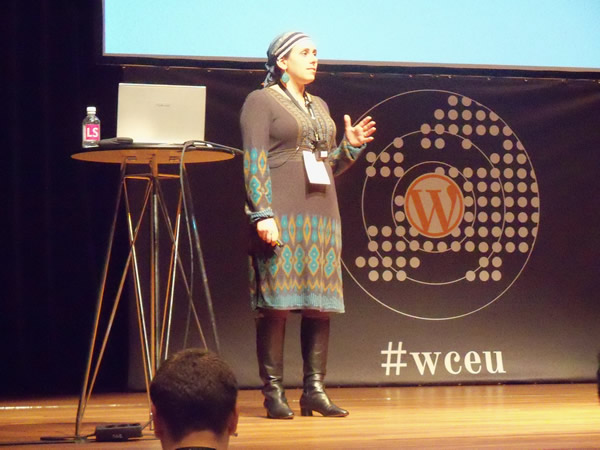
 Photo Credit – “My Personal WordPress Hero”
Photo Credit – “My Personal WordPress Hero” 




